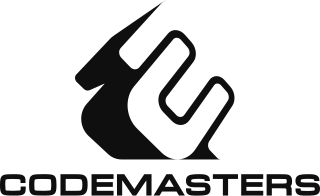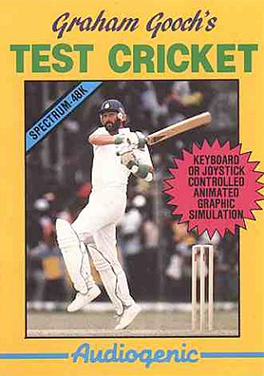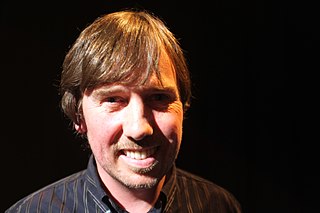
Krome Studios Melbourne, originally Beam Software, was an Australian video game development studio founded in 1980 by Alfred Milgrom and Naomi Besen and based in Melbourne, Australia. Initially formed to produce books and software to be published by Melbourne House, a company they had established in London in 1977, the studio operated independently from 1987 until 1999, when it was acquired by Infogrames, who changed the name to Infogrames Melbourne House Pty Ltd.. In 2006 the studio was sold to Krome Studios.
The Commodore 64 amassed a large software library of nearly 10,000 commercial titles, covering most genres from games to business applications, and many others.

The Codemasters Software Company Limited is a British video game developer based in Southam, England, which is a subsidiary of American corporation Electronic Arts and managed under its EA Sports division. Founded by brothers Richard and David Darling in October 1986, Codemasters is one of the oldest British game studios, and in 2005 was named the best independent video game developer by magazine Develop. It formerly also published third-party games.

Datel is a UK-based electronics and game console peripherals manufacturer. The company is best known for producing a wide range of hardware and peripherals for home computers in the 1980s, for example replacement keyboards for the ZX Spectrum, the PlusD disk interface and the Action Replay series of video game cheating devices.

Loopz is a puzzle video game designed and programmed by Ian Upton for the Atari ST in 1989. He previously worked as head game designer for Audiogenic, who acquired exclusive rights to the game, then in 1990 arranged for Mindscape to publish it for computers in North America and consoles worldwide.

Emlyn Hughes International Soccer (EHIS) is a soccer computer game first released in 1988 by Audiogenic Software Ltd. The game is named after the popular English footballer Emlyn Hughes. It initially appeared on the Commodore 64, with other versions produced for the Amstrad CPC, ZX Spectrum, Atari ST and Amiga.
Swordfish Studios Limited was a British video game developer based in Birmingham founded by Trevor Williams and Joan Finnegan in September 2002.

The Commodore 64 Games System is the cartridge-based home video game console version of the popular Commodore 64 home computer. It was released in December 1990 by Commodore into a booming console market dominated by Nintendo and Sega. It was only released in Europe and was a considerable commercial failure. The C64GS came bundled with a cartridge containing four games: Fiendish Freddy's Big Top O'Fun, International Soccer, Flimbo's Quest, and Klax.
Interceptor Micros, also known as Interceptor Software and later as Interceptor Group, was a British developer/publisher of video games for various 8-bit and 16-bit computer systems popular in Western Europe during the eighties and early nineties.

Brian Lara Cricket is a cricket video game, the first in the Brian Lara Cricket series. It is endorsed by Brian Lara. Brian Lara Cricket was released on the PC in 1994 for DOS and Sega Mega Drive and Amiga in 1995 by Codemasters. The game was also rereleased in 1999 under the Codemaster Classics brand for Windows. It was developed by Audiogenic. The Mega Drive version spent 10 weeks at number 1 in the UK games charts during the summer of 1995. The game is a rebranded version of Graham Gooch World Class Cricket.

Graham Gooch World Class Cricket is a cricket video game developed and published by Audiogenic in 1993. It is endorsed by former England cricketer Graham Gooch and is available for the Amiga and PC computer systems.

Graham Gooch's Test Cricket is a 1985 cricket game released for the Acorn Electron, BBC Micro, Commodore 64 and ZX Spectrum by Audiogenic. It was later reissued by budget label Alternative Software as Graham Gooch's Match Cricket.

Supersoft is a software and computer game developer and publisher founded in England in 1978. It was founded by Peter Calver and Pearl Wellard to develop and publish software primarily for the Commodore PET.
Transmission Games was an Australian game development company, specialising in sports and action games. Originally, Transmission Games was established as IR Gurus Pty Ltd in 1996 by Craig Laughton, Andrew Niere, and Ian Cunliffe with the motto "Game Play is Everything". The company name was changed in February 2008 to Transmission Games and was later purchased by a third party investor. The company was subsequently wound up some 18 months later by the new owner.
Brian Lara Cricket is a series of six cricket video games that are endorsed by the West Indian cricketer Brian Lara and published by Codemasters.

Brian Lara Cricket '96, known as Lara '96 and Shane Warne Cricket in Australia and New Zealand, is the sequel to Brian Lara Cricket and the second game in the Brian Lara-endorsed series of cricket video games. It was developed by Audiogenic for Codemasters and released in 1996 for the Sega Mega Drive, Amiga and PC systems.

International Cricket 2010 is a sports association cricket simulation video game developed by Trickstar Games and released by Codemasters. It was released in the United Kingdom and India on 18 June 2010 and in Australia on 21 October. The game is a part of the Codemasters Cricket series preceded by the Brian Lara Cricket Series and is a direct sequel to the 2009 release, Ashes Cricket 2009.

David Darling is a British video game developer and entrepreneur, known for co-founding Codemasters, with his brother Richard Darling, and for being involved in a long succession of top ten games over more than 30 years. He is now founder and CEO of smartphone app developer and publisher Kwalee.













